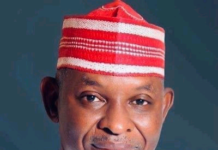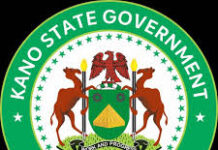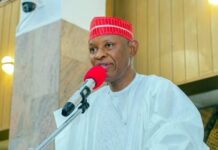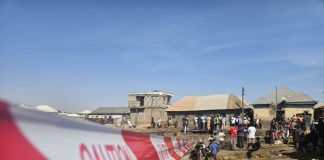Kano, one of Nigeria’s oldest and most revered emirates, boasts a rich history dating back to 999 AD when Bagauda, a grandson of the legendary hero Bayajidda, became its first king . Strategically located in Northern Nigeria, Kano Emirate has long been a vital hub of commerce, trade, and Islamic scholarship, earning its reputation as a powerhouse in the region. The emirate’s significance extends beyond its historical and cultural importance, as it plays a crucial role in maintaining peace and stability in Northern Nigeria.
The Kano Emirate has faced similar challenges in the past, notably, during the Fulani conquest of 1805, which led to the emergence of the Sokoto Caliphate. Another significant crisis occurred in the late 19th century, when two rival claimants fought a civil war for the throne from 1893 to 1895. More recently, the emirate has been plagued by internal conflicts and power struggles, which have raised concerns about its stability and potential impact on the wider region. The importance of preventing the emirate’s decline cannot be overstated, as its failure could have far-reaching consequences for Northern Nigeria.
The demise of other kingdoms serves as a stark reminder of the devastating consequences of internal conflicts and power struggles. The Kingdom of Katsina, for instance, was weakened by the rivalry between its rulers, Muhammadu Korau and Umaru dan Ibrahim, in the late 18th century. Similarly, the Songhai Empire was brought down by the internal conflicts and external pressures that arose during the reign of Askia Ishaq II in the 16th century . The fall of the Mali Empire, which was plagued by succession crises and internal power struggles, including the infamous conflict between Sundiata Keita’s brothers, is another cautionary tale.These examples underscore the urgent need for stakeholders in the Kano and the North to work towards resolving the current crisis and promoting unity, lest they suffer a similar fate.
The current crisis in the Kano Emirate can be attributed to two main factors: the repeal of the Kano Emirate law and the reinstatement of Emir Muhammadu Sanusi II. The repeal of the law, which was passed in 2019, had created four new emirates, effectively reducing the power and influence of the traditional Kano Emirate . This move was seen as a political maneuver by former Governor Abdullahi Ganduje to diminish the influence of Emir Sanusi II, who was a vocal critic of his administration.
The reinstatement of Emir Sanusi II has its roots in the rivalry between two former governors of Kano state, Rabiu Kwankwaso and Abdullahi Ganduje . The Kano State House of Assembly’s decision to reinstate Sanusi II as the Emir of Kano is seen by other political rival group as a direct response to the perceived injustices perpetrated by previous administration . However, this move has been met with resistance, and the matter is currently pending before the Supreme Court. The crisis has highlighted the complex web of politics and tradition in the Kano Emirate, and its resolution will have significant implications for the state’s governance and stability.
The current situation in Kano, where both HRH Sunusi Lamido Sunusi and HRH Aminu Ado Bayero are claiming status, is a pressing concern that demands urgent attention and action. This crisis has the potential to undermine the stability and unity of the Emirate, and it’s imperative that stakeholders take a proactive approach to resolve the issue. In this context, it’s essential that Kwankwaso and Ganduje put aside their political differences and work towards a solution.
As a mark of honour to the late Galadiman Kano, Kwankwaso and Ganduje should look beyond their political landscape and prioritise the interests of Kano. By doing so, they can help to restore peace and stability to the Emirate, and ensure that the legacy of the late Galadiman Kano continues to inspire future generations. As Dr. Abdulmumin Jibrin Kofa, Chairman of the House Committee on Housing and Habitat, emphasised, reconciliation between Kwankwaso and Ganduje is crucial for the benefit of Kano state .
Kano, the revered commercial hub of Northern Nigeria, has been a beacon of prosperity and unity for centuries. Its rich history, dating back to the pre-colonial era, is a testament to the city’s resilience and strength. However, in recent times, Kano’s unity has been threatened by political divisions and power struggles. The demise of Alhaji Abbas Sanusi, the esteemed Galadiman Kano, has brought together warring political factions, reminding us that Kano’s survival and stability supersede personal interests and party affiliations.
The late Galadiman Kano was a highly respected figure, not only as an uncle to the current 16th Emir of Kano but also as the biological father of Abdullahi Abbas, the state APC Chairman. His passing has created a sense of unity among the ruling New Nigerian People Party (NNPP) and the All Progressives Congress (APC), as they put aside their differences to mourn the loss of this iconic leader. This rare display of solidarity serves as a poignant reminder that Kano’s peace, unity, and stability are paramount.
The recent history of Kano Emirate has been marred by controversy, particularly with the abolition of the Kano Emirate Law, which led to the creation of four new emirates. These emirates, namely Bichi, Karaye, Gaya, and Rano, were established during the administration of former Governor Abdullahi Ganduje ¹. However, the Kano State House of Assembly later dissolved these emirates, reinstating Emir Sunusi Lamido Sunusi after his dethronement.
The repelled Kano Emirate Law, which abolished the previous emirates, has left a lingering sense of uncertainty and division within the state. The power struggle between the ruling party and the opposition has created an atmosphere of tension, threatening the very fabric of Kano’s unity. It is imperative that all parties involved recognize the importance of putting Kano’s interests above personal and political gain.
As we mourn the passing of Alhaji Abbas Sanusi, we are reminded that Kano’s survival is supreme. The city’s rich history, cultural heritage, and economic significance make it a treasure that must be protected and preserved. It is our collective responsibility to ensure that Kano remains a beacon of peace, unity, and stability, not just for Northern Nigeria but for the entire country.
The death of Alhaji Abbas Sanusi serves as a wake-up call for all Kano stakeholders to prioritize the city’s unity and stability. We must recognize that our differences are insignificant compared to the importance of preserving Kano’s rich heritage and ensuring its continued prosperity. By putting aside our personal and political interests, we can work towards a brighter future for Kano, one that honors the legacy of leaders like Alhaji Abbas Sanusi.
The late Galadimai of Kano left an indelible mark on the development of Kano and the Emirate. As a respected titleholder and an eldest kingmaker, he played a crucial role in shaping the Emirate’s growth and progress. His contributions to the traditional institution, leadership, and community development have been widely acknowledged.
As a senior kingmaker, Abbas Sanusi was instrumental in promoting peace, stability, and unity within the Emirate. His wisdom, guidance, and leadership helped to foster harmony among the people of Kano, earning him the respect and admiration of the community. President Bola Ahmed Tinubu aptly described him as a “strong pillar of the traditional institution” whose contributions will be remembered far beyond Kano Emirate and Kano State.
The burial of Abbas Sanusi brought together notable figures who have been at the forefront of the current Emirate conflicts in Kano. The presence of Sunusi Lamido Sunusi, Emir of Kano , The Governor of Kano State Abba Kabir Yusuf, the leader of the Kwankwasiya Movement and National leader of NNPP Dr. Rabiu Musa Kwankwaso, Deputy Senate President BarauJibrin, Baba Dan Agundi, also known as Babba Mai tuta, and Iliyasu Kwankwaso, a prominent critic of the Kwankwasiya movement and host of highly respected figures, served as a reminder that even in the midst of conflict, unity and reconciliation are possible. Their attendance at the burial calls for more diligence on the part of followers to put aside their differences and work towards a common goal.
The death of Galadiman Kano has signaled a new era of unity and an end to the ongoing power play within the Kano Emirate. As a respected figure in the Emirate, his passing has brought together individuals and groups who may have been at odds with each other. This newfound unity is a testament to the power of reconciliation and the importance of putting aside differences in the face of adversity. As followers reflect on the life and legacy of Galadiman Kano, they are reminded that death is an inevitable duty that all souls must pay, but it can also serve as a catalyst for unity and positive change.
To address the ongoing crisis rocking the Kano Emirate, the elders must urgently intervene to prevent further escalation. They should immediately convene an emergency meeting to discuss the issues at hand, listen to all parties involved, and work towards finding a peaceful resolution. The elders must also take a firm stance against divisive actions and rhetoric, promoting instead a message of unity and reconciliation. Furthermore, they should engage with key stakeholders, including the state government, religious leaders, and community groups, to foster a collaborative approach to resolving the crisis. Ultimately, the elders’ swift and decisive action is crucial in restoring peace and stability to the Emirate.
The current situation in Kano, where both Sunusi Lamido Sunusi and Aminu Ado Bayero are claiming status, is a pressing concern that demands urgent attention and action. This crisis has the potential to undermine the stability and unity of the Emirate, and it’s imperative that stakeholders take a proactive approach to resolve the issue. In this context, it’s essential that Kwankwaso and Ganduje put aside their political differences and work towards a solution.
As a mark of honour to the late Galadiman Kano, Kwankwaso and Ganduje should look beyond their political landscape and prioritize the interests of Kano. By doing so, they can help to restore peace and stability to the Emirate, and ensure that the legacy of the late Galadiman Kano continues to inspire future generations. Kano’s rich cultural heritage and historical significance make it a vital part of Nigeria’s identity, and its downfall would be detrimental to the nation. To prevent this, elders in Kano must take on a more proactive role in promoting peace, unity, and stability.
The passing of Galadiman Kano, Alhaji Abbas Sanusi, has sparked a glimmer of hope for reconciliation in Kano. The city, which has been embroiled in a bitter dispute over the emirate’s throne, may finally have an opportunity to heal and move forward. The conflict, which pits Muhammadu Sanusi II against Aminu Ado Bayero, has been ongoing since Governor Abba Kabir Yusuf reinstated Sanusi, leading to Bayero challenging his removal in court . However, with the death of Galadiman Kano, there is a sense that the time has come for the warring parties to put aside their differences and work towards a common goal.
As Kano mourns the loss of Galadiman Kano, it is essential that the city’s leaders seize this moment to forge a path towards reconciliation. The people of Kano deserve peace and stability, and it is the responsibility of their leaders to provide it. By putting aside their personal interests and working towards a common goal, the leaders of Kano can ensure that the city emerges from this period of turmoil stronger and more united than ever. The death of Galadiman Kano may be a sad occasion, but it can also be a catalyst for positive change in Kano.
May the soul of late Galadiman Kano rest in Jannatul Firdausi ,Ameen.
Danaudi writes from Bauchi via danaudicomrade@gmail.com







